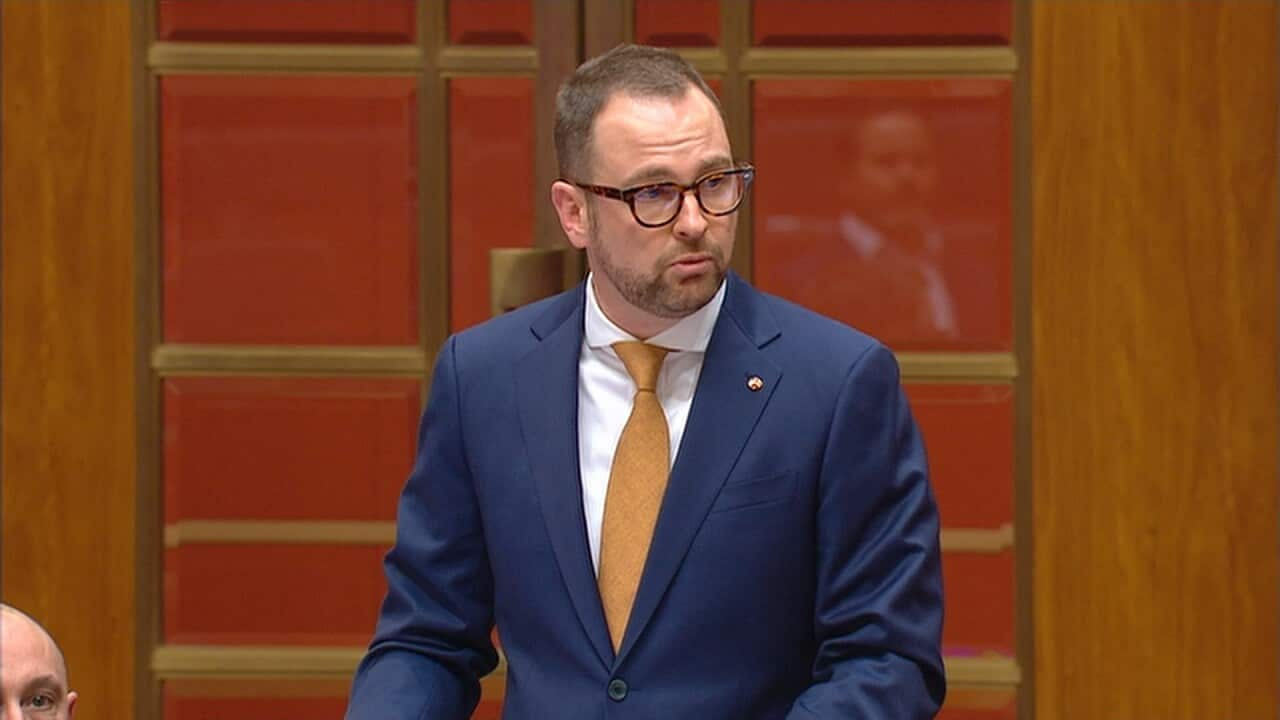Home Affairs Minister Peter Dutton created headlines when he became the first Australian politician diagnosed with coronavirus in early March, but he would not be the last.
Liberal senators Andrew Bragg and Susan McDonald as well as Centre Alliance Senator Rex Patrick all experienced first-hand what it is like to have COVID-19 after testing positive to the virus.
Now recovered and back at work after weeks in isolation, their personal experiences could play a big role in shaping the next stages of Australia’s response to the global pandemic.
A trip to attend a wedding proved costly for Senator Bragg who tested positive for COVID-19 in March.
The wedding at Stanwell Tops was one of what's become known as "super events" with 42 guests falling ill with coronavirus. Senator Bragg started to experience severe flu-like symptoms while out inspecting a wind farm near Dubbo more than a week later.
Senator Bragg started to experience severe flu-like symptoms while out inspecting a wind farm near Dubbo more than a week later.

Liberal senator Andrew Bragg was one of four Australian politicians who tested positive for COVID-19 Source: Supplied
After getting the positive result, he says trying to retrace his steps during the 10 days between transmission and diagnosis was one of the most difficult parts of the whole experience.
“Your brain isn’t at its best when you’re processing 'oh my god, I’ve got coronavirus',” Senator Bragg told SBS News.
“My first reaction was just to get in touch with everyone I had been in contact with because it was such a long time until I was tested and got my results back.
“It’s a great advertisement for downloading the app because it can be very difficult to piece together everywhere you went and who you’d spoken to.”
It turned out Senator Bragg had inadvertently passed on the virus to some of his colleagues.
The thought that he had put his friends, family and colleagues at risk left did not sit well with Senator Bragg.
“I felt very bad that I had put some people at risk and so I was in touch with a lot the people I had been in contact with to see how they were going because I felt guilty.
“It’s not rational but, when you have potentially put people at risk, through no fault of your own, you still feel bad that you have put someone else at risk.” One of those people he passed it on to was crossbencher Rex Patrick who had attended a Senate committee with him before testing positive.
One of those people he passed it on to was crossbencher Rex Patrick who had attended a Senate committee with him before testing positive.

South Australian senator Rex Patrick Source: Supplied
Senator Patrick said he was very shocked to learn he had the virus because he had not shown any symptoms.
He immediately self-isolated once realising he had spent time with Senator Bragg - an experience he did not find too difficult.
“Perhaps in a lighthearted way being a former submariner I was used to being isolated from a lot of my friends and family for long periods," he said.
“I was asymptomatic, so it didn’t impact me on the health front, just a change to my routine and being forced to work from home in isolation.
“I was lucky as well that I can do my job from home in isolation because there have been just as many people who haven’t been able to.”
Senator Patrick was concerned about the stigma surrounding the coronavirus.
“I was a victim as was anyone who caught this virus, it's a matter of just circumstance and no one should have blame directed at them because they have caught it,” he said.
'Very scary'
It's a sentiment shared by Queensland LNP Senator Susan McDonald who still doesn’t know how she contracted COVID-19.
Senator McDonald was the second Australian politician to test positive and immediately went into self-isolation after coming down with a fever and sore throat.
“It was very scary to arrive at the isolation room to be greeted by people in full protective gear and then only being able to communicate via intercom," she said.
“I was very worried at first about my health but my concern quickly moved to the people I had been in contact with.”
Senator McDonald's experience reinforced to her the importance of the COVIDSafe tracing app in containing the spread of COVID-19. She says the community should work together to protect those most vulnerable to the virus.
She says the community should work together to protect those most vulnerable to the virus.

Queensland LNP senator Susan McDonald recovered from coronavirus Source: Supplied
"Most people who test positive don't have a way to tell the people they may come across on public transport or pass in the street," Senator McDonald said.
"This is a disease, especially for the vulnerable in our society, which can do a lot of damage.
"I think it is critical to have a tracing app so we can throw a blanket over the people we have had contact with and quickly control the spread."
With Australia slowly fighting its way through the pandemic, these politicians bring a unique perspective to discussions about the roadmap towards a "new normal".
"In this case, we've got four parliamentarians who can bring a post-COVID set of experiences to the Parliament and a slightly different perspective," Senator Patrick said.
People in Australia must stay at least 1.5 metres away from others. Check your state’s restrictions on gathering limits. Testing for coronavirus is now widely available across Australia.
If you are experiencing cold or flu symptoms, arrange a test by calling your doctor or contact the Coronavirus Health Information Hotline on 1800 020 080.
The federal government's coronavirus tracing app COVIDSafe is available for download from your phone's app store.
SBS is committed to informing Australia’s diverse communities about the latest COVID-19 developments.

